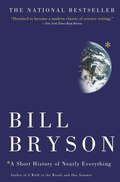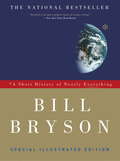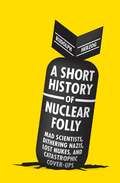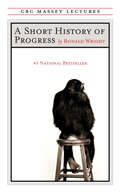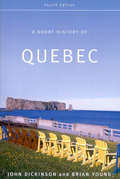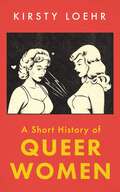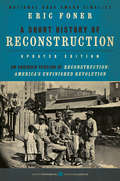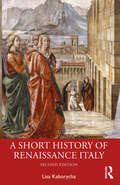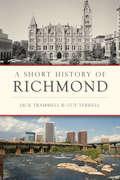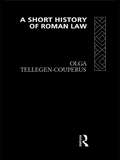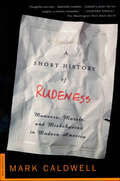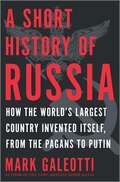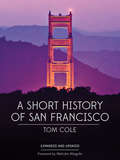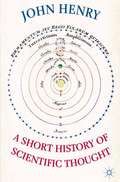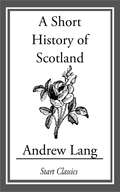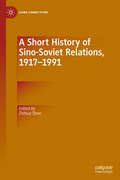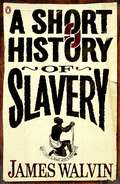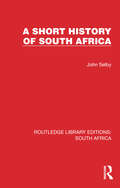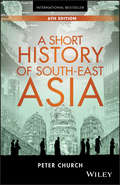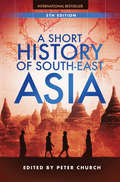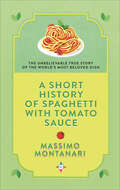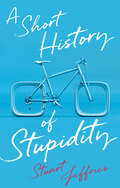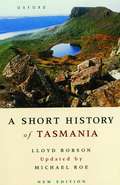- Table View
- List View
A Short History of Nearly Everything (Bryson Ser. #5)
by Bill BrysonOne of the world's most beloved writers and bestselling author of One Summer takes his ultimate journey--into the most intriguing and intractable questions that science seeks to answer.In A Walk in the Woods, Bill Bryson trekked the Appalachian Trail--well, most of it. In A Sunburned Country, he confronted some of the most lethal wildlife Australia has to offer. Now, in his biggest book, he confronts his greatest challenge: to understand--and, if possible, answer--the oldest, biggest questions we have posed about the universe and ourselves. Taking as territory everything from the Big Bang to the rise of civilization, Bryson seeks to understand how we got from there being nothing at all to there being us. To that end, he has attached himself to a host of the world's most advanced (and often obsessed) archaeologists, anthropologists, and mathematicians, travelling to their offices, laboratories, and field camps. He has read (or tried to read) their books, pestered them with questions, apprenticed himself to their powerful minds. A Short History of Nearly Everything is the record of this quest, and it is a sometimes profound, sometimes funny, and always supremely clear and entertaining adventure in the realms of human knowledge, as only Bill Bryson can render it. Science has never been more involving or entertaining.
A Short History of Nearly Everything: Special Illustrated Edition
by Bill BrysonBill Bryson is one of the world's most beloved and bestselling writers. In A Short History of Nearly Everything, he takes his ultimate journey-into the most intriguing and consequential questions that science seeks to answer. It's a dazzling quest, the intellectual odyssey of a lifetime, as this insatiably curious writer attempts to understand everything that has transpired from the Big Bang to the rise of civilization. Or, as the author puts it, "...how we went from there being nothing at all to there being something, and then how a little of that something turned into us, and also what happened in between and since." This is, in short, a tall order.To that end, Bill Bryson apprenticed himself to a host of the world's most profound scientific minds, living and dead. His challenge is to take subjects like geology, chemisty, paleontology, astronomy, and particle physics and see if there isn't some way to render them comprehensible to people, like himself, made bored (or scared) stiff of science by school. His interest is not simply to discover what we know but to find out how we know it. How do we know what is in the center of the earth, thousands of miles beneath the surface? How can we know the extent and the composition of the universe, or what a black hole is? How can we know where the continents were 600 million years ago? How did anyone ever figure these things out?On his travels through space and time, Bill Bryson encounters a splendid gallery of the most fascinating, eccentric, competitive, and foolish personalities ever to ask a hard question. In their company, he undertakes a sometimes profound, sometimes funny, and always supremely clear and entertaining adventure in the realms of human knowledge, as only this superb writer can render it. Science has never been more involving, and the world we inhabit has never been fuller of wonder and delight.From the Hardcover edition.
A Short History of Nuclear Folly: Mad Scientists, Dithering Nazis, Lost Nukes, and Catastrophic Cover-ups
by Jefferson Chase Rudolph HerzogIn the spirit of Dr. Strangelove and The Atomic Café, a blackly sardonic people's history of atomic blunders and near-misses revealing the hushed-up and forgotten episodes in which the great powers gambled with catastrophe. Rudolph Herzog, the acclaimed author of Dead Funny, presents a devastating account of history's most irresponsible uses of nuclear technology. From the rarely discussed nightmare of "Broken Arrows" (40 nuclear weapons lost during the Cold War) to "Operation Plowshare" (a proposal to use nuclear bombs for large engineering projects, such as a the construction of a second Panama Canal using 300 H-Bombs) . . . Herzog focuses in on long-forgotten nuclear projects that nearly led to disaster.Digging deep into archives, interviewing censored scientists, and including dozens of photos, Herzog also explores the "accidental" drop of a Nagasaki-type bomb on a train conductor's home, the implanting of plutonium into patients' hearts, and the invention of wild tactical nukes, including weapons designed to kill enemy astronauts.Told in a riveting narrative voice, Herzog--the son of filmmaker Werner Herzog--also draws on childhood memories of the final period of the Cold War in Germany, the country once seen as the nuclear battleground for NATO and the Warsaw Pact, and discusses evidence that Nazi scientists knew how to make atomic weaponry ... and chose not to. An unprecedented people's history.
A Short History of Progress: Fifteenth Anniversary Edition (The CBC Massey Lectures)
by Ronald WrightNow more relevant than ever, Ronald Wright’s #1 national bestseller, A Short History of Progress. The fifteenth anniversary edition includes a new introduction warning of the accelerating patterns of progress and disaster.Each time history repeats itself, so it’s said, the price goes up. The twentieth century was a time of runaway growth in human population, consumption, and technology, placing a colossal load on all natural systems, especially earth, air, and water — the very elements of life. The most urgent questions of the twenty-first century are: Where will this growth lead? Can it be consolidated or sustained? And what kind of world is our present bequeathing to our future?In his #1 national bestseller A Short History of Progress Ronald Wright argues that our modern predicament is as old as civilization, a 10,000-year experiment we have participated in but seldom controlled. Only by understanding the patterns of triumph and disaster that humanity has repeated around the world since the Stone Age can we recognize the experiment’s inherent dangers, and, with luck and wisdom, shape its outcome. In his new introduction to the fifteenth anniversary edition, Wright looks at the past fifteen years of human innovation — and asks whether we can still get the future right.
A Short History of Quebec
by John A. Dickinson Brian YoungJohn A. Dickinson and Brian Young bring a refreshing perspective to the history of Quebec, focusing on the social and economic development of the region as well as the identity issues of its diverse peoples. This revised fourth edition covers Quebec's recent political history and includes an updated bibliography and chronology and new illustrations. A Canadian classic, A Short History of Quebec now takes into account such issues as the 1995 referendum, recent ideological shifts and societal changes, considers Quebec's place in North America in the light of NAFTA, and offers reflections on the Gérard Bouchard-Charles Taylor Commission on Accommodation and Cultural Differences in 2008.
A Short History of Queer Women
by Kirsty LoehrNo, they weren&’t &‘just friends&’! Queer women have been written out of history since, well, forever. &‘But historians famously care about women!&’, said no one. From Anne Bonny and Mary Read who sailed the seas together disguised as pirates, to US football captain Megan Rapinoe declaring &‘You can&’t win a championship without gays on your team&’, via countless literary salons and tuxedos, A Short History of Queer Women sets the record straight on women who have loved other women through the ages. Who says lesbians can&’t be funny?
A Short History of Reconstruction
by Eric FonerFrom the "preeminent historian of Reconstruction" (New York Times Book Review), a newly updated AND abridged edition of the prizewinning classic on the post-Civil War period that shaped modern AmericaIn this updated edition of the abridged Reconstruction, Eric Foner redefines how the post-Civil War period was viewed. Reconstruction chronicles the way in which Americans--black and white--responded to the unprecedented changes unleashed by the war and the end of slavery. It addresses the quest of emancipated slaves searching for economic autonomy and equal citizenship, and describes the remodeling of Southern society, the evolution of racial attitudes and patterns of race relations, and the emergence of a national state possessing vastly expanded authority and committed, for a time, to the principle of equal rights for all Americans. This "masterful treatment of one of the most complex periods of American history" (New Republic) remains the standard work on the wrenching post-Civil War period--an era whose legacy still reverberates in the United States today.
A Short History of Renaissance Italy
by Lisa KaborychaFrom Giotto’s artistic revolution at the dawn of the fourteenth century to the scientific discoveries of Galileo in the early seventeenth, this book explores the cultural developments of one of the most remarkable and vibrant periods of history—the Italian Renaissance. What makes the period all the more amazing is that this flowering of the visual arts, literature, and philosophy occurred against a turbulent backdrop of civic factionalism, foreign invasions, war, and pestilence. The fifteen chapters move briskly from the Fall of the Roman Empire in the West through the growth of the Italian city-states, where, in the crucible of pandemic disease and social unrest, a new approach to learning known as humanism was forged, political and religious certainties challenged. Traversing the entire Italian Peninsula— Florence, Rome, Milan, Venice, Naples and Sicily—this book examines the rich regional diversity of Renaissance cultural experience and considers men’s and women’s lives, their changing social attitudes and beliefs across three centuries. This second edition has been updated throughout; it now contains dozens of color images and timelines, as well as links to the author's new companion book of primary sources, Voices from the Italian Renaissance. Readers will need no preliminary background on the subject matter, as the story is told in a lively, readable narrative. Interdisciplinary in nature, its characters are merchants, bankers, artists, saints, soldiers of fortune, poets, popes, and courtesans. With brief literary excerpts, first-hand accounts, maps, and illustrations that help bring the era to life, this is an ideal text for students in a college survey course, as well as for the interested general reader or traveler to Italy who is curious to learn more about the extraordinary heritage of the Renaissance.
A Short History of Richmond (Brief History)
by Jack Trammell Guy TerrellThe seven hills at the James River fall line that Captain John Smith first witnessed in 1607 became the site of a pivotal American city. Richmond was a birthplace of the American Revolution. It became the permanent capital of Virginia and served as the capital of the Confederacy during the Civil War. In the early twentieth century, industry expanded in the city as companies like DuPont and Philip Morris built factories. Cultural institutions expanded, with Richmond's first radio station and movie theater opening in the 1920s, before the Great Depression hit the city hard. The city rose from financial struggle to a highly industrialized center for manufacturing and vital transportation hub. Join authors Jack Trammell and Guy Terrell as they narrate the rich history of the River City.
A Short History of Roman Law
by Olga Tellegen-CouperusThe most important creation of the Romans was their law. In this book, Dr Tellegen-Couperus discusses the way in which the Roman jurists created and developed law and the way in which Roman law has come down to us. Special attention is given to questions such as `who were the jurists and their law schools' and to the close connection between jurists and the politics of their time.
A Short History of Rudeness: Manners, Morals, and Misbehavior in Modern America
by Mark CaldwellA funny and provocative cultural history of class, manners, and the decline of civilityIn his smart and thought provoking new book, literary/social critic Mark Caldwell gives us a history of the demise of manners and charts the progress of an epidemic of rudeness in America. The breakdown of civility has in recent years become a national obsession, and our modern climate of boorishness has cultivated a host of etiquette watchdogs, like Miss Manners and Martha Stewart, with which we defend ourselves against an onslaught of nastiness. But Caldwell demonstrates that the foundations of etiquette actually began to corrode several centuries ago with the blurring of class lines. Touching on aspects of both our public and private lives, including work, family, and sex, A Short History of Rudeness examines how the rules of our behaviour have changed and explains why, no matter how hard we try, we can never return to a golden era of manners and mores.
A Short History of Russia: How The World's Largest Country Invented Itself, From The Pagans To Putin
by Mark GaleottiA Library Journal 2020 Title to WatchRussia’s epic and dramatic history told in an accessible, lively and short form, from Ivan the Terrible to Vladimir Putin via Catherine the Great, the Russian Revolution and the fall of the USSR.Russia is a country with no natural borders, no single ethnic group, no true central identity. At the crossroads of Europe and Asia, it has been subject to invasion by outsiders, from Vikings to Mongols, from Napoleon’s French to Hitler’s Germans. In order to forge an identity, it has mythologized its past to unite its people and to signal strength to outsiders.In A Short History of Russia, Mark Galeotti explores the history of this fascinating, glorious, desperate and exasperating country through two intertwined issues: the way successive influences from beyond its borders have shaped Russia, and the way Russians came to terms with this influence, writing and rewriting their past to understand their present and try to influence their future. In turn, this self-invented history has come to affect not just their constant nation-building project but also their relations with the world.
A Short History of San Francisco
by Tom ColeThis is the story of San Francisco, a unique and rowdy tale with a legendary cast of characters. It tells of the Indians and the Spanish missions, the arrival of thousands of gold seekers and gamblers, crackbrains and dreamers, the building of the transcontinental railroad and the cable car, labor strife and political shenanigans, the 1906 earthquake and fire, two World Wars, two World's Fairs, two great bridges, the beatniks and hippies and New Left—a story that is so marvelous and wild that it must be true. A new afterword from the author brings The City into the twenty-first century: a time just as hectic, experimental, and opportunistic as its rambunctious past.
A Short History of San Francisco
by Tom ColeA concise, &“colorful, well-told&” history of the City by the Bay, from the Gold Rush to the Summer of Love to the twenty-first century (Los Angeles Times). This is the story of San Francisco, a unique and rowdy tale with a legendary cast of characters. It tells of the Indians and the Spanish missions, the arrival of thousands of gold seekers and gamblers, crackbrains and dreamers, the building of the transcontinental railroad and the cable car, labor strife and political shenanigans, the 1906 earthquake and fire, two World Wars, two World's Fairs, two great bridges, the beatniks and hippies and New Left—a story that is so marvelous and wild that it must be true. A new afterword from the author in this updated third edition brings The City into the twenty-first century—a time just as hectic, experimental, and opportunistic as its rambunctious past.
A Short History of Science to the Nineteenth Century
by Charles SingerDriven by an unquenchable thirst, the human spirit seeks an explanation of the world. In this fascinating study, a noted historian of science traces the course of the ceaseless yearning for answers across two and a half millennia and chronicles, in simple form, the development of the idea of a rational and interconnected material world. This account begins with the earliest recordings of true science among the Ionian Greeks and proceeds to detail the development of unitary systems of thought among Plato, Aristotle, the Stoics, and others. Examinations of the science of imperial Rome ― including Roman mathematics, astronomy, physics, and calendarial science ― give rise to the science of the Middle Ages and the influence of Scholasticism, the rise of humanism, and the reawakened scientific spirit of the early Renaissance. These developments in turn led to the downfall of Aristotelian science in the seventeenth century, the Galilean revolution, Newtonian mathematical physics, and finally, the enthronement of determinism in the eighteenth and nineteenth centuries. Profusely illustrated with maps and diagrams, this comprehensive yet concise volume offers an absorbing, readable history of science up to the dawn of the modern era.
A Short History of Scientific Thought
by John HenryAn essential introductory textbook that shows students how science came to be such an important aspect of modern culture. Lively and readable, it provides a rich historical survey of the major developments in scientific thought, from the Ancient Greeks to the twentieth century. John Henry also explains how new scientific theories have emerged and analyses their impact on contemporary thinking. This is an ideal core text for modules on the History of Science, Medicine and Technology, or the History and Philosophy of Science - or a supplementary text for broader modules on European History or Intellectual History - which may be offered at the upper levels of an undergraduate History, Philosophy or Science degree. In addition it is a crucial resource for students who may be studying the history of science for the first time as part of a taught postgraduate degree in European History, Intellectual History, Science or Philosophy.
A Short History of Scotland
by Andrew LangAndrew Lang (1844-1912) was a prolific Scots man of letters, a poet, novelist, literary critic and contributor to anthropology. He now is best known as the collector of folk and fairy tales. He was educated at the Edinburgh Academy, St Andrews University and at Balliol College, Oxford. As a journalist, poet, critic and historian, he soon made a reputation as one of the ablest and most versatile writers of the day. Lang was one of the founders of the study of "Psychical Research," and his other writings on anthropology include The Book of Dreams and Ghosts (1897), Magic and Religion (1901) and The Secret of the Totem (1905). He was a Homeric scholar of conservative views. Other works include Homer and the Epic (1893); a prose translation of The Homeric Hymns (1899), with literary and mythological essays in which he draws parallels between Greek myths and other mythologies; and Homer and his Age (1906). He also wrote Ballades in Blue China (1880) and Rhymes la Mode (1884).
A Short History of Sino-Soviet Relations, 1917–1991 (China Connections)
by Zhihua ShenDrawing on the rich trove of recently declassified Russian and Chinese archival materials, this history of Sino-Soviet relations in the 20th century sheds new light on key events during this period. It offers fresh insights into the role of ideology and national interests in the evolution of the complex and turbulent relationship between not just the two countries but also their respective Communist Parties. The chapters on the normalization of bilateral ties provide an in-depth analysis of divisions in the socialist camp that culminated in both its collapse and the disintegration of the Soviet Union. The book argues that 20th century Sino-Soviet relations reflected both long-standing and emerging political and geopolitical challenges facing members of the Cold War socialist camp, in particular tensions between the ideal of internationalism and national aspirations, between commitment to the principle of sovereignty and commitment to that of equality in international relations, and between inter-party relations and inter-state relations. This makes for a valuable addition to the reading lists of all those interested in the development of the relationship between two of the world’s most important countries.
A Short History of Slavery
by James WalvinAs we approach the bicentenary of the abolition of the Atlantic trade, Walvin has selected the historical texts that recreate the mindset that made such a savage institution possible - morally acceptable even. Setting these historical documents against Walvin's own incisive historical narrative, the two layers of this extraordinary, definitive account of the Atlantic slave trade enable us to understand the rise and fall of one of the most shameful chapters in British history, the repercussions of which the modern world is still living with.
A Short History of South Africa (Routledge Library Editions: South Africa #16)
by John SelbyOriginally published in 1973, this book begins with the arrival of the Europeans in South Africa. It examines the part played by the Dutch, British and Afrikaners, as well the diverse ethnic groups including the Xhosa and Zulus. The complicated period of the Difiqane or ‘Forced Migrations’ is clearly discussed as is the genesis and evolution of Apartheid. Other major events which are discussed include the advent of the 1820 Settlers, the Great Trek, the discovery of diamonds, the Jameson Raid, the occupation of land which became Zimbabwe, the Anglo-Boer Wars and the two World Wars. Accounts are given of Sharpeville and the subsequent introduction of legislation formalising separate development.
A Short History of South-East Asia
by Peter ChurchThe success of the first four editions shows that this book fills a vacuum for readers who wish to learn about the countries of South-East Asia. Recent years have seen a number of important developments all of which are covered here. <P><P>With the global climate becoming more uncertain and the threat of terrorism spilling over, this book will aid readers' knowledge of this region by addressing its historical past and political future.
A Short History of South-East Asia
by Peter ChurchThe success of the first four editions shows that this book fills a vacuum for readers who wish to learn about the countries of South-East Asia. Recent years have seen a number of important developments all of which are covered here. With the global climate becoming more uncertain and the threat of terrorism spilling over, this book will aid readers' knowledge of this region by addressing its historical past and political future.
A Short History of Spaghetti with Tomato Sauce: The Unbelievable True Story of the World's Most Beloved Dish
by Massimo MontanariA surprisingly wide-ranging journey into the story of this beloved dish and “an utterly fascinating discourse on food history” (The Daily Beast).Intellectually engaging and deliciously readable, this is a stereotype-defying history of how one of the most recognizable symbols of Italian cuisine and national identity is the product of centuries of encounters, dialogue, and exchange.Is it possible to identify a starting point in history from which everything else unfolds—a single moment that can explain the present and reveal the essence of who we are? According to Massimo Montanari, this is just a myth. Historical phenomena can only be understood dynamically—by looking at how events and identities develop and change as a result of encounters and combinations that are often unexpected.As he shows in this lively, brilliant, and surprising essay, finding the origin of spaghetti—or anything else—is not as simple as it may seem. By tracing the history of the one of Italy’s “national dishes” —from Asia to America, from Africa to Europe; from the beginning of agriculture to the Middle Ages and up to the twentieth century—he reveals that in order to understand our own identity, we almost always need to look beyond ourselves to other cultures, peoples, and traditions.“Montanari’s research will delight readers and provide plenty of fodder for dinner-table discussion.” —Booklist“Full of delicious details.” —Publishers Weekly
A Short History of Stupidity
by Stuart JeffriesWe are living, it is often said, in a golden age of stupidity, in which boneheaded, mendacious politicians get elected by voters who’ve become too mindless to realize their interests are ill served by narcissists, while vapid social media influencers corrupt their no less witless followers with groundless conspiracy theories and eye-wateringly foolish takedowns of scientific expertise. Our time, one might be forgiven for thinking, is one in which the fool’s gold of stupidity has become a desirable commodity, a must-have, with bumbling celebrities venerated more than those who have more than two brain cells to rub together. In this book, Stuart Jeffries analyses how we got into this parlous state and wonders if the stupid, like the poor, are always with us, or if, rather, stupidity is like Japanese knotweed, difficult to root out but to be exterminated with extreme prejudice. He considers what some of the greatest of minds – Socrates, Buddha, Voltaire, Arendt, and others – have to tell us about the slippery nature of stupidity. During a narrative that takes us from ancient Greece to artificial intelligence, and accompanied by such heroes of stupidity as Flaubert’s double act Bouvard and Pécuchet, Jeffries casts a sceptical eye on attempts to root out stupidity by such means as IQ tests, eugenics, gene editing, and racist education policies, finding each attempt to be more stupid than the stupidity they were ostensibly devised to eradicate. If today we are living in a fool’s paradise, has our species become too dim to learn anything from its rich history of folly?
A Short History of Tasmania
by Lloyd L. Robson Michael RoeThis is a concise and lively history of Tasmania from its earliest times to the late 1990s. It is also a case study of British colonization in Australia, tracing the rocky path from invasion to modernity, from the rigors of Van Dieman's Land to the Franklin Dam controversy. For this new edition, Michael Roe has added two new chapters which provide a history up to 1996.
